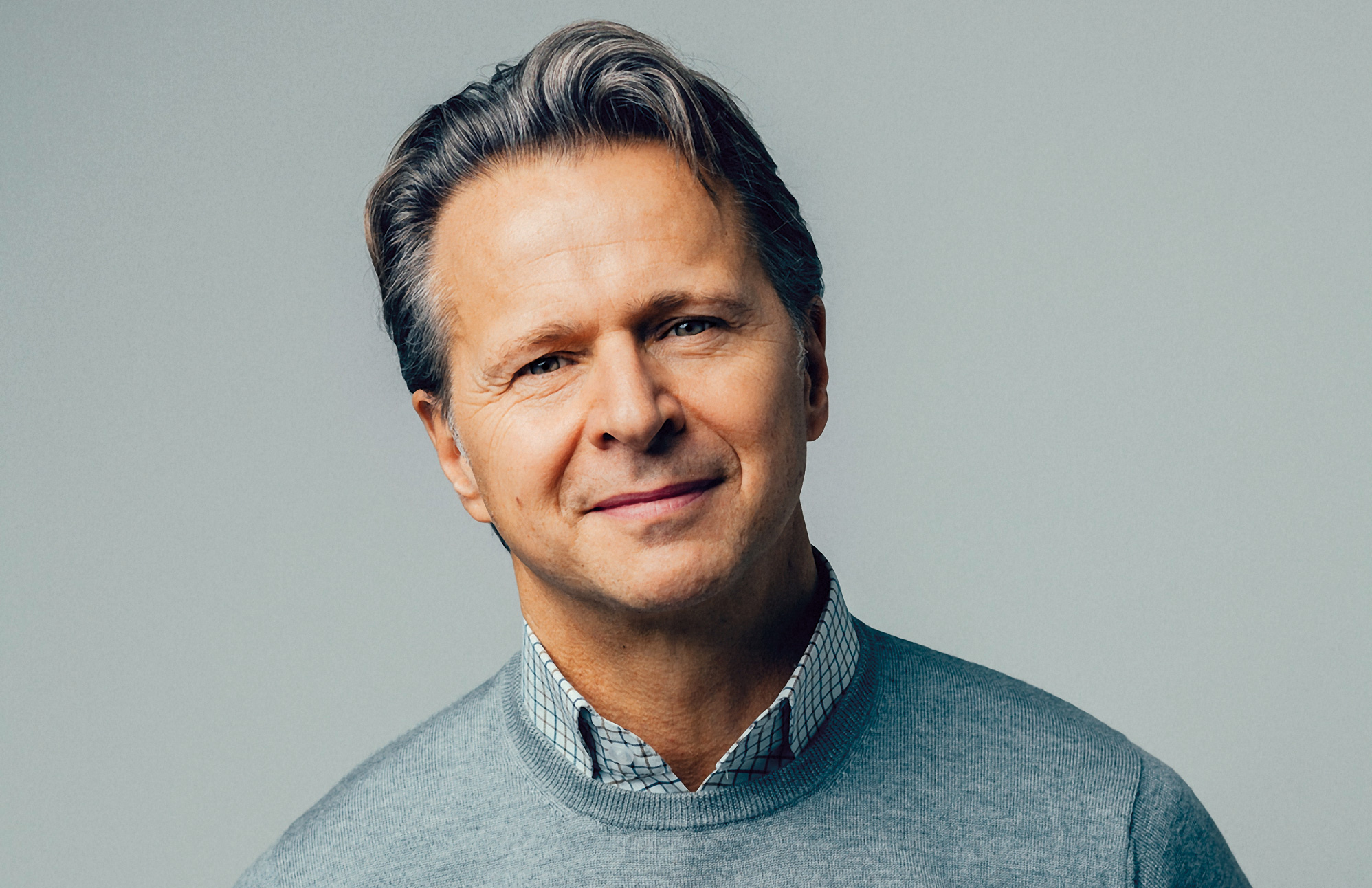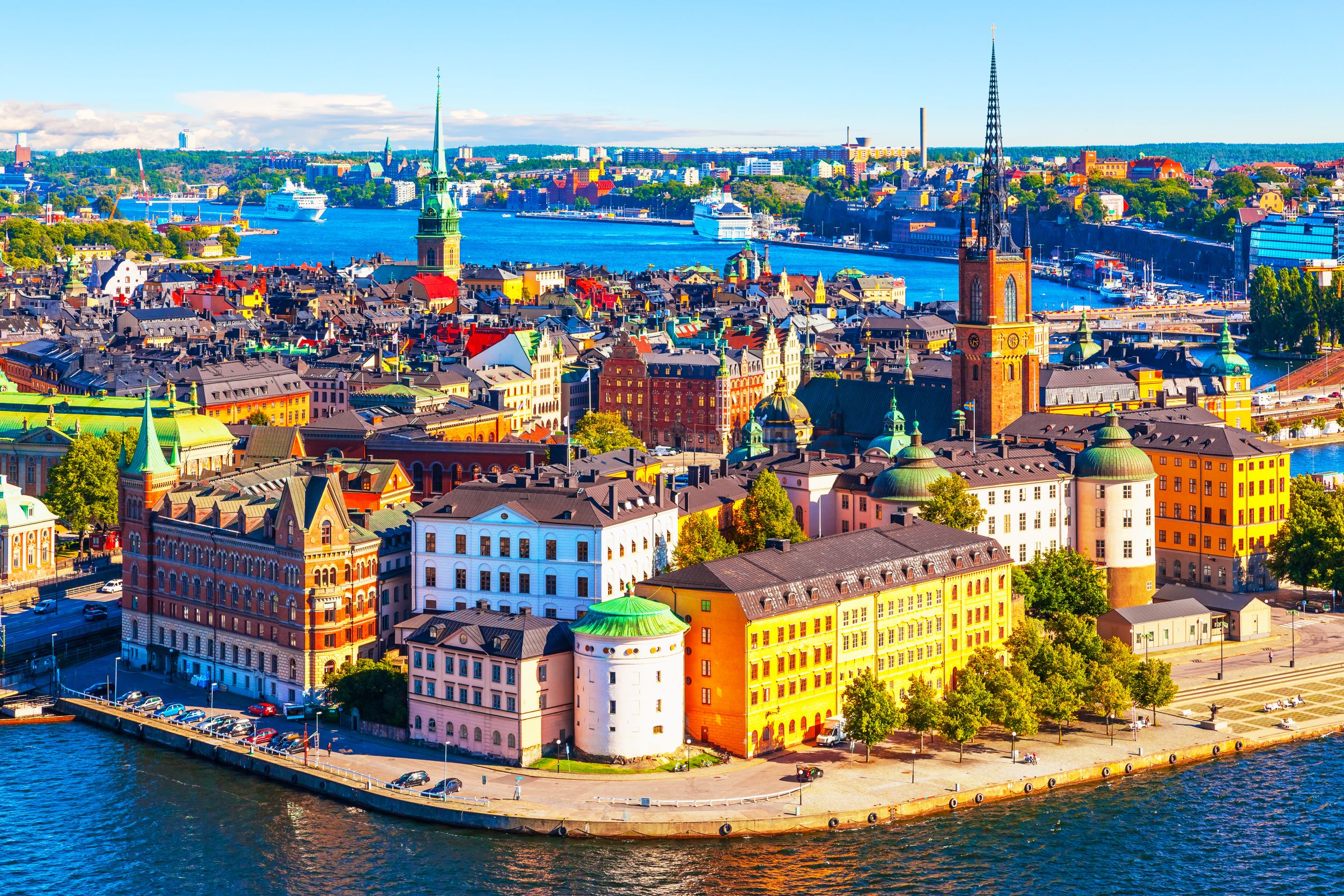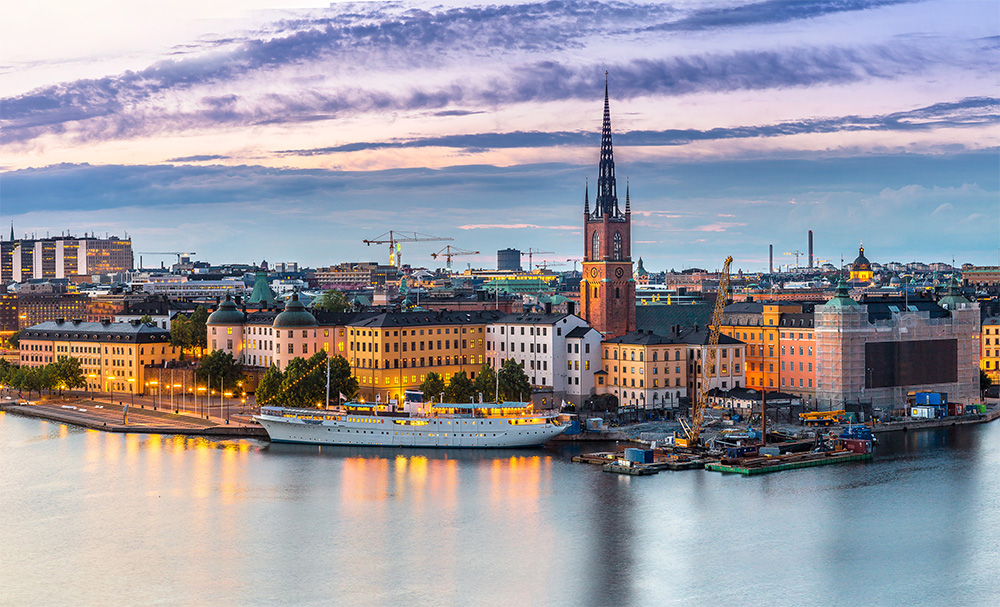[vc_row][vc_column width=”1/2″][vc_column_text]
Sweden
The light green area is the rest of the European Union
Sweden was the 22nd largest economy in the world by nominal GDP in 2018. Its GDP per capita was $54,112 USD, which is above the average for the OECD and High Income countries. Sweden is an open and dynamic market economy underpinned by high taxation and welfare. It was ranked 8th in the World Bank's Human Capital Index and 5th in the Economic Complexity Index in 2017. It is a member of the OECD and EU. It is not a member of the euro area. Services was the largest economic sector in 2018 (64.7 percent of GDP), followed by manufacturing (13.8 percent), and agriculture (1.04 percent). In 2017, the largest export sectors were services (32.2 percent), machinery (12.96 percent), agriculture (11.16 percent), vehicles (9.77 percent), and chemicals (9.22 percent). The largest individual exports were ICT services (19.18 percent), travel and tourism (6.19 percent), transport services (4.8 percent), cars (3.78 percent), and refined petroleum (3.35 percent). Its largest export partners were Germany (10.44 percent), Norway (9.9 percent), Finland (6.76 percent), Denmark (6.76 percent), and the US (6.58 percent). The largest goods imports were cars (5.9 percent), crude oil (4.8 percent), refined oil (3.82 percent), and parts of motor vehicles (3.61 percent). Sweden enjoyed strong productivity and economic growth between 1870 and 1970. It transformed itself from an agrarian to an industrial nation. This can be explained by a number of factors including the export of timber and ore to industrial Britain at the turn of the 19th century, its neutrality during both World Wars, and institutional reforms in the late 1800s. It has also benefitted from cheap electricity (hydropower) and its export orientation. In the 1980s and early 1990s, the economy struggled. Public debt was too high, and regulations had eroded the international competitiveness of Swedish firms. The government responded with fiscal discipline, a flexible exchange rate, and microeconomic reforms. The microeconomic reforms led to productivity gains, particularly in manufacturing, services, and export orientated industries. Key microeconomic reforms included deregulation of: banking and finance, power generation and distribution, telecommunications, and rail freight. The global financial crisis led to a recession but Sweden recovered quickly through the depreciation of the Krona and fiscal and monetary and fiscal stimulus. Sweden has also become a leader in start-ups and the new economy with Spotify its most famous example.
[/vc_column_text][vc_column_text] Its population in 2018 was 9,982,709 [1]
Its population in 2018 was 9,982,709 [1]
 In 2015, 53.25% of its total energy
In 2015, 53.25% of its total energy
consumption was renewable [2]
 In 2021, its GDP grew by 4.80% [2]
In 2021, its GDP grew by 4.80% [2]
 In 2021 it had a positive Current
In 2021 it had a positive Current
Account Balance of US$bn 34.59 [3]
 Its unemployment rate in 2021 was 8.80% [3]
Its unemployment rate in 2021 was 8.80% [3]
 Its Expenditure on R&D (as a percentage of
Its Expenditure on R&D (as a percentage of
GDP) in 2020 was 3.53% [2]
 A Big Mac will set you back the
A Big Mac will set you back the
local equivalent of US$5.84 [4]
What free trade areas or economic unions is it a member of?
Member of the European Union (EU) since 01/01/1995
Other members:
Austria, Belgium, Bulgaria, Croatia, Cyprus, Czechia, Denmark, Estonia, Finland, France, Germany, Greece, Hungary, Ireland, Italy, Latvia, Lithuania, Luxembourg, Malta, Netherlands, Poland, Portugal, Romania, Slovakia, Slovenia, Spain
What trade deals are there between European Union and other countries and economic unions?
EU - Andorra Customs Union (from 01/01/1991)
European Single Market (SM) (from 01/01/1993)
EU - Sri-Lanka Co-operation and Partnership Agreement (from 01/04/1995)
EU - Türkiye Customs Union (from 31/12/1995)
EU - Faroe Islands Agreement (from 01/01/1997)
EU - Palestinian Authority Interim Association Agreement (from 01/07/1997)
EU - Tunisia Association Agreement (from 01/03/1998)
EU - Armenia Partnership and Cooperation Agreement (from 09/09/1999)
EU - Morocco Association Agreement (from 01/03/2000)
EU - Israel Association Agreement (from 01/06/2000)
EU - Mexico Global Agreement (from 01/10/2000)
EU - San Marino Customs Union (from 01/04/2002)
EU - Jordan Association Agreement (from 01/05/2002)
EU - North Macedonia Stabilisation and Association Agreement (from 01/04/2004)
EU - Pakistan Co-operation agreement (from 29/04/2004)
EU - Egypt Association Agreement (from 01/06/2004)
EU - Chile Association Agreement and Additional Protocol (from 01/03/2005)
EU - Algeria Association Agreement (from 01/09/2005)
EU - Lebanon Association Agreement (from 01/04/2006)
EU - Albania Stabilisation and Association Agreement (from 01/04/2009)
EU - Pacific States Interim EPA (from 20/12/2009)
EU - Montenegro Stabilisation and Association Agreement (from 01/05/2010)
EU - Central America Association Agreement (from 01/08/2013)
EU - Serbia Stabilisation and Association Agreement (from 01/09/2013)
EU - Bosnia and Herzegovina Stabilisation and Association Agreement (from 01/06/2015)
EU - South Korea Free Trade Agreement (from 01/07/2015)
EU - Kosovo Stabilisation and Association Agreement (from 01/04/2016)
EU - Georgia Association Agreement (from 01/07/2016)
EU - Moldova Association Agreement (from 01/07/2016)
EU - Canada Comprehensive Economic and Trade Agreement (CETA) (from 21/09/2017)
EU - Eswatini (SADC) Economic Partnership Agreement (from 05/02/2018)
EU - Lesotho (SADC) Economic Partnership Agreement (from 05/02/2018)
EU - Mozambique (SADC) Economic Partnership Agreement (from 05/02/2018)
EU - Namibia (SADC) Economic Partnership Agreement (from 05/02/2018)
EU - South Africa Economic Partnership Agreement (from 05/02/2018)
EU - Botswana (SADC) Economic Partnership Agreement (from 05/02/2018)
EU - Japan Economic Partnership Agreement (from 01/02/2019)
EU - Eastern and Southern Africa States free trade agreement (from 07/02/2019)
UK - EU Trade Deal (from 01/01/2021)
[/vc_column_text][vc_column_text]What trade deals are there with other countries and economic unions?
None
[/vc_column_text][/vc_column][vc_column width=”1/2″][vc_column_text]Patrik Lundström: Break on Through to the Green Side of Clothing Production…
What You Need to Know About Stockholm+50
The Fog of War: The Tragic Triumph of Hope Over Experience – The Folly of Great Powers
Power Meets Pluck: Paranoid and Haunted, President Putin Sees Nazis Everywhere
In Search of Lost Time: Mapping the Chip on Russia’s Shoulder
Industry’s Most Exciting Space: Untold Billions Showered on Battery and Electric Vehicle Technology and Production
Vidici Busting Myth on Nordic Fintech: It’s Still an Under-served Sector
Free Trade in Retreat in Europe due to Environmental and Labour Standards
Svenska Cellulosa Aktiebolaget SCA: Growing Forests and Renewable Products to Fight Climate Change
Sweden – A Controversial Approach Belatedly Vindicated
Trade with the United Kingdom
Source: UK Office for National Statistics, October 2022.
Contains public sector information licensed under the Open Government Licence v3.0.


























































































